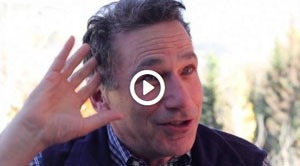
What if the main problem with peace isn’t that it is naïve but that it is misunderstood?
What if the main problem with peace isn’t that it is naïve but that it is misunderstood?
 William Ury, co-founder of Harvard’s Program on Negotiation and a leading expert on negotiation and mediation, suggested this is the case at the One Earth Future Forum. Mr. Ury brought over three decades’ worth of experience resolving all forms of conflict to the question of whether peace was possible in the 21st century. In this interview filmed at the Aspen Institute, Mr. Ury makes three points that speak directly to the nature of preventing violent conflict, as well as to OEF’s work.
William Ury, co-founder of Harvard’s Program on Negotiation and a leading expert on negotiation and mediation, suggested this is the case at the One Earth Future Forum. Mr. Ury brought over three decades’ worth of experience resolving all forms of conflict to the question of whether peace was possible in the 21st century. In this interview filmed at the Aspen Institute, Mr. Ury makes three points that speak directly to the nature of preventing violent conflict, as well as to OEF’s work.
The first point is that peace isn’t what most people think it is. It’s not a perfect end state; it’s a process of replacing violent forms of conflict resolution with non-violent ones. Paradoxically, as Mr. Ury says in the interview, preventing violent conflict is more about making the world safe for conflict than it is about eliminating it altogether. Injustice needs to be engaged wherever it’s found, which inevitably requires conflict. The trick is to embrace non-violent tactics over violent ones and to promote structures that mitigate violence rather than promote it.
The second point is that replacing violent methods for conflict-resolution with non-violent ones is entirely possible. Here Mr. Ury speaks directly from his experience. “When I started in this business 35 years ago,” he says, “people said the Cold War is going to go on forever, South Africa is always going to have apartheid, the Catholics and Protestants are always going to be killing each other in Northern Ireland. All those things that people thought were absolutely impossible turned out to be possible.”
 The final point, closely related to the second, is that changing peoples’ mindsets about the feasibility of peace is essential. People have a feeling that peace is impossible, and that feeling turns into a self-fulfilling prophecy. Because people believe it is fruitless, they are unwilling to adequately invest in preventative techniques, even those with a promising track record. This is the case even though the long term trends suggest that there is in fact less war year-to-year on average.
The final point, closely related to the second, is that changing peoples’ mindsets about the feasibility of peace is essential. People have a feeling that peace is impossible, and that feeling turns into a self-fulfilling prophecy. Because people believe it is fruitless, they are unwilling to adequately invest in preventative techniques, even those with a promising track record. This is the case even though the long term trends suggest that there is in fact less war year-to-year on average.
For my part, I’ve spent most of this past year working on a strategic plan with OEF’s Founder, so I can’t help but think of this in terms of how OEF approaches and talks about its work. We need to choose programs based not only on their ability to help people in the short term, but on their ability over the long term to demonstrate the effectiveness of non-violent conflict resolution to those outside the peacebuilding and peacemaking communities. We need to be crystal clear that we have no intention of eliminating all human conflict, but instead hope to find outlets for that conflict that are less violent and more productive. Finally, we need to make the peace movement seem less like the hippie movement and more like the public health movement.
Because in the end, Mr. Ury is right. Peace isn’t what most people think it is; it’s entirely possible, and achieving it will require changing peoples’ minds about its feasibility.
Article Details
Published
Written by
Topic
Program
Content Type
Opinion & Insights